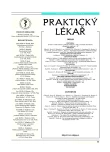Can we recognize the patient’s willingness to abide by the physician’s advice?
Poznáme skutočnú ochotu pacienta dodržiavať rady lekára?
Kardiovaskulárne ochorenia sú v centre pozornosti, stále dominuje problém arteriálnej hypertenzie, ktorá patrí medzi choroby s najčastejším výskytom a s relatívne nízkou efektivitou farmakoterapie. Pre úspech liečby je mimo konania lekára rozhodujúci prístup pacienta, jeho ochota dodržiavať pokyny lekára, režimové opatrenia a medikamentóznu liečbu (1). Vzhľadom k nepriaznivej situácii vo vývoji kardiovaskulárnej chorobnosti považujeme určenie faktorov ovplyvňujúcich compliance pacienta za dôležitý predpoklad skvalitnenia zdravotnej starostlivosti s minimom nákladov. V našej práci sa pokúšame nájsť odpovede na niektoré nezodpovedané otázky v compliance k liečbe arteriálnej hypertenzie.
Kľúčové slová:
arteriálna hypertenzia – compliance – zdravotná výchova.
Authors:
J. Gajdošík; M. Kriška
Authors‘ workplace:
Ambulancia praktického lekára, Nové Zámky, Slovenská republika
Published in:
Prakt. Lék. 2005; 85(2): 108-112
Category:
General Medicine
Overview
Cardiovascular diseases are permanently in the center of the physician’s attention. The main problem is arterial hypertension, which belongs to the most frequent diseases. There are some points necessary for successful treatment: the physician’s approach, the patient’s willingness to abide by the physician’s advice, mode of regimen, pharmacotherapy. With regard to the situation in cardiovascular diseases it is necessary to establish the factors influencing the patient’s compliance. This is the base of health care for patients with hypertension and it is a prerequisite for improving health care quality with minimal expenses. In our work we would like to find answers to some of the unanswered questions regarding compliance to therapy in arterial hypertension.
Key words:
arterial hypertension – compliance – health education.
Labels
General practitioner for children and adolescents General practitioner for adultsArticle was published in
General Practitioner

2005 Issue 2
- Advances in the Treatment of Myasthenia Gravis on the Horizon
- Hope Awakens with Early Diagnosis of Parkinson's Disease Based on Skin Odor
- Memantine in Dementia Therapy – Current Findings and Possible Future Applications
- Memantine Eases Daily Life for Patients and Caregivers
- Possibilities of Using Metamizole in the Treatment of Acute Primary Headaches
-
All articles in this issue
- Guidelines for diagnostic and therapeutic procedures in arterial hypertension – the 2004 version Czech Society of Hypertension guidelines
- WHO on the problems of sun bathing in solarium facilities
- Physical activity and cancer prevention
- Treatment of traumatic lesions of the brachial plexus
- Patients treated for addiction disorders at the Bohnice Psychiatric Clinic in the years 1994–2003
- Inborn anomalies of the coronary arteries: three case reports
- Diagnosis and treatment patient with acute endocarditis
- Brachyspirae – agents of intestinal spirochetosis
- The diabetic foot and hyperbaric oxygen therapy
- The anxious patient with cardiovascular symptomatology
- Can we recognize the patient’s willingness to abide by the physician’s advice?
- General Practitioner
- Journal archive
- Current issue
- About the journal
Most read in this issue
- Brachyspirae – agents of intestinal spirochetosis
- The diabetic foot and hyperbaric oxygen therapy
- Treatment of traumatic lesions of the brachial plexus
- Inborn anomalies of the coronary arteries: three case reports
